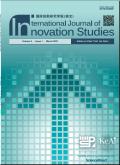Technological opportunism on green innovation and the ambivalent effect of atmospheric quality perception
IF 5.3
Q2 MANAGEMENT
引用次数: 0
Abstract
Despite the growing body of literature on innovation studies, there remains a paucity of research examining the role of government support and air quality perception when investigating the drivers of green innovation within the manufacturing industry in emerging economies. This article introduces technological opportunism as an antecedent of green innovation adoption and examines government support and air quality as moderators. It considers the relationships between green innovation and cost performance, supplier trust, government legitimacy and public reputation. By analyzing both cross-sectional and longitudinal data, the results reveal that technological opportunism significantly contributes to green innovation adoption, with government support amplifying this effect. The interaction effect of air quality, however, presented contrasting results. While technology-sensing capability positively influences green innovation in low-pollution contexts, its effect diminishes in high-pollution scenarios. Conversely, technology-response capability has an insignificant positive effect on green innovation when air pollution is low but a significant positive effect when air pollution is high. The longitudinal study further corroborates that green innovation adoption enhances corporate image and reduces operational costs over time. This study provides empirical evidence for policymakers and practitioners aiming to embrace sustainable practices and innovations.
技术机会主义对绿色创新的影响与大气质量感知的矛盾效应
尽管关于创新研究的文献越来越多,但在调查新兴经济体制造业绿色创新的驱动因素时,关于政府支持和空气质量感知的作用的研究仍然很少。本文介绍了技术机会主义作为绿色创新采用的先决条件,并考察了政府支持和空气质量作为调节因素。它考虑了绿色创新与成本绩效、供应商信任、政府合法性和公众声誉之间的关系。通过对横向和纵向数据的分析,结果表明技术机会主义显著促进了绿色创新的采用,而政府支持放大了这一效应。然而,空气质量的相互作用却呈现出截然相反的结果。技术感知能力在低污染环境下对绿色创新具有积极影响,在高污染环境下对绿色创新的影响减弱。反之,当空气污染较低时,技术响应能力对绿色创新的正向影响不显著,而当空气污染较高时,技术响应能力对绿色创新的正向影响显著。纵向研究进一步证实,随着时间的推移,采用绿色创新提高了企业形象,降低了运营成本。本研究为旨在接受可持续实践和创新的政策制定者和实践者提供了经验证据。
本文章由计算机程序翻译,如有差异,请以英文原文为准。
求助全文
约1分钟内获得全文
求助全文
来源期刊

International Journal of Innovation Studies
Business, Management and Accounting-Strategy and Management
CiteScore
8.10
自引率
0.00%
发文量
23
审稿时长
19 weeks
 求助内容:
求助内容: 应助结果提醒方式:
应助结果提醒方式:


